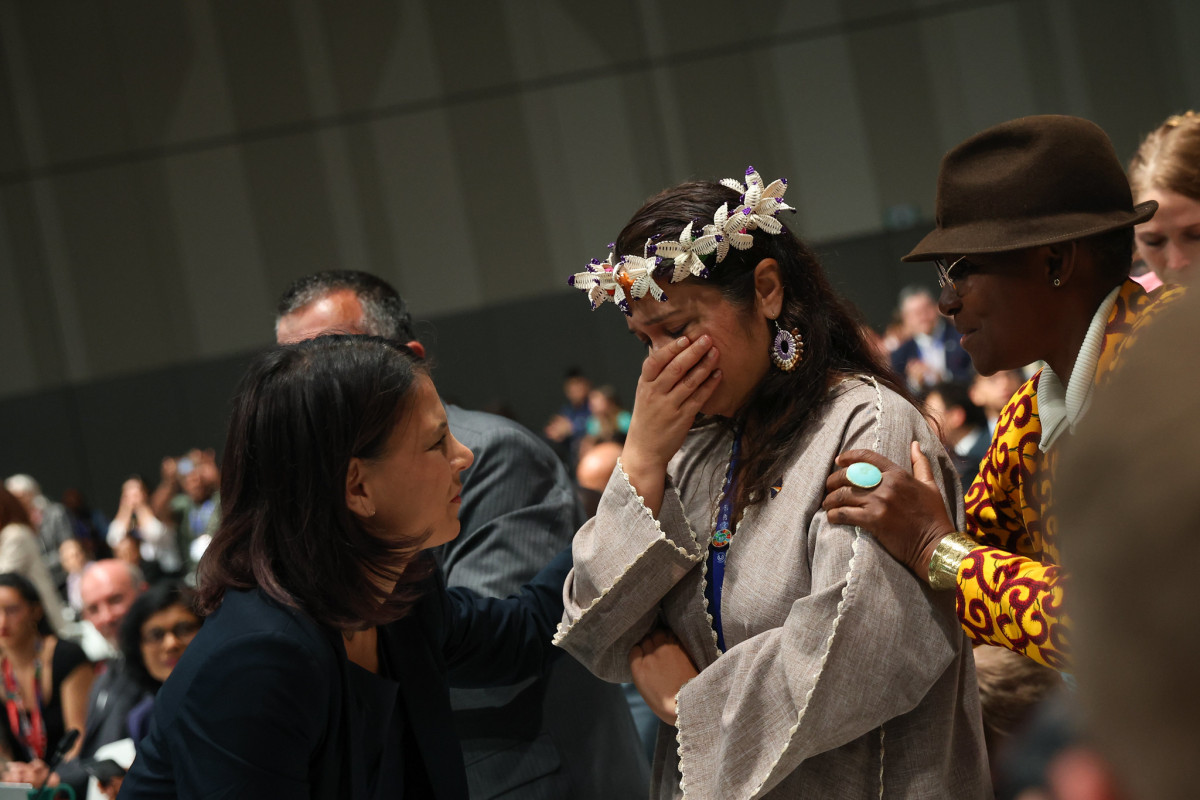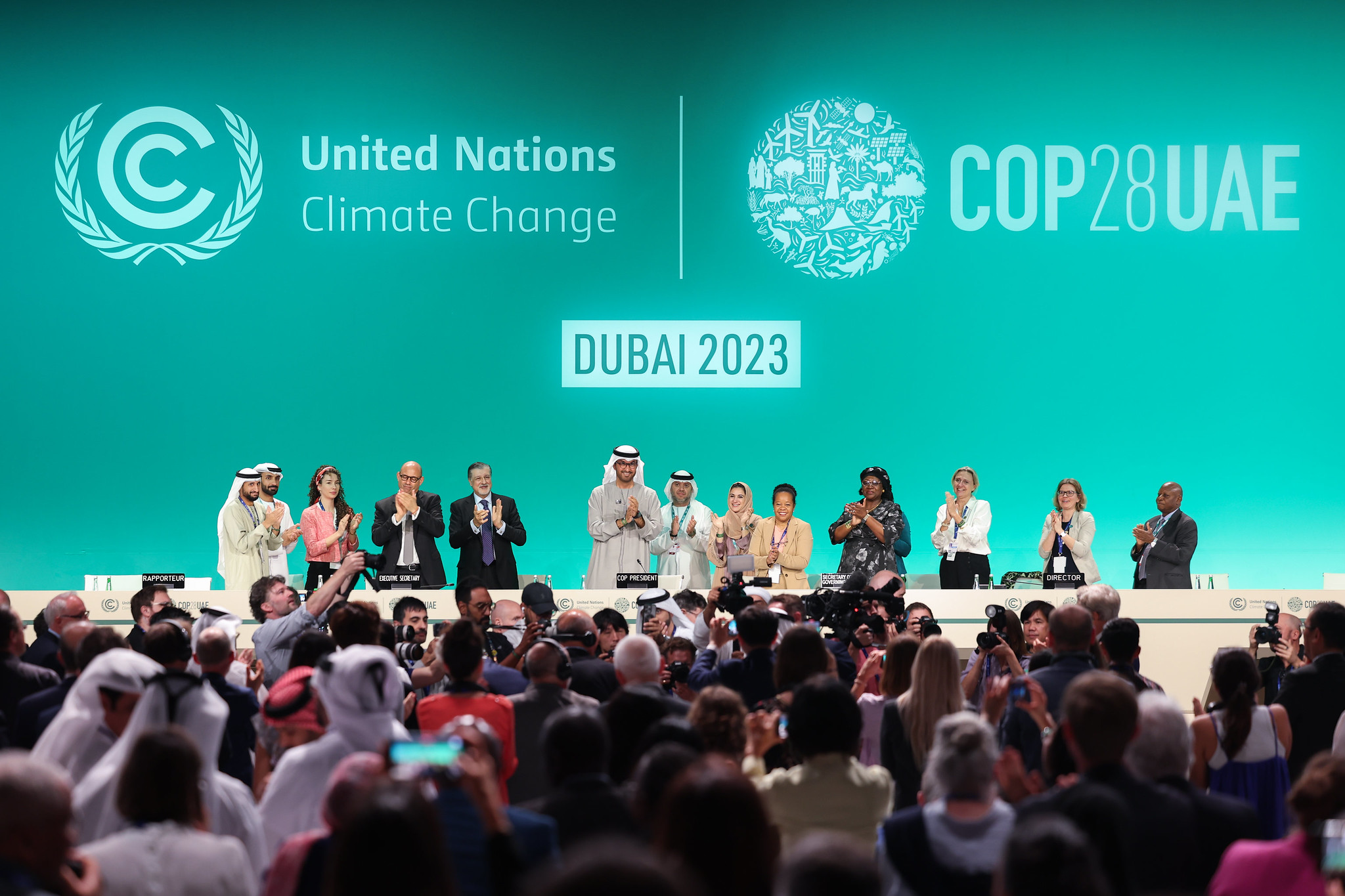EU welcomes COP28 deal which “seals end of fossil fuel era”
European governments have welcomed the first-ever agreement by the global community to transition away from fossil fuel energy sources at the UN climate change conference COP28 in Dubai.
“This climate conference seals the end of the fossil fuel era,” German foreign minister Annalena Baerbock said in Dubai. “Anyone who can do the maths knows that investments in fossil fuels are not profitable in the long term.” She added that the outcome of the conference is “historic” not just because it signifies progress on climate action, but also because it is “a sign of hope in these difficult geopolitical times that multilateralism still works if we are willing to come out of our comfort zones.”
Governments from almost 200 countries agreed to transition away from fossil fuels, quickly ramp up renewables, financially support vulnerable developing economies dealing with unavoidable losses and damages from climate change, and decided basic goals regarding adaptation to climate change effects. Talks had run into overtime, as countries entered difficult overnight negotiations especially on language to exit fossil fuels. The EU and others pushed for an agreement to phase these out, while producers like Saudi Arabia initially resisted.
Looking at the EU’s priorities going into the negotiations, there is “no doubt” that the bloc “can be happy with the result,” Dan Jørgensen, Denmark’s minister for global climate policy, commented. Global targets for renewable energy and efficiency made it into the result thanks to the EU’s insistence, he added. “No doubt that was on the table because of the European Union and we succeeded in getting it through.” Still, the result is not a perfect text, Jørgensen told Clean Energy Wire. “The EU is also on the side of the developing world and especially the small island states that are hit hardest by climate change. We could have done more for them.”
Dutch member of the European Parliament (MEP) Bas Eickhout said that “the overall message coming out of this is quite positive and pretty close to what the EU had in its mandate.” However, the success of COP28 would be measured by how countries implement the results, he told Clean Energy Wire. The EU would be one of the first to decide a target for 2040, with the European Commission due to present a proposal by early 2024. “Europe is obliged to show how we are going to draft our 2040 target without fossils in the energy system,” Eickhout said. “If the world needs to be at zero in 2050, we need to be at zero in 2040.”
Denmark’s Jørgensen said COP28 sent a “signal that will probably also be reflected in the markets. We will now compete on who can make this transition the fastest.”
In Dubai, countries assessed how far the global community had come towards reaching Paris Agreement targets since the landmark pact was agreed in 2015 – a process dubbed the “Global Stocktake,” which is meant to push countries to ratchet up their climate protection efforts every five years. By the end of 2024 or early 2025, countries are called upon to present new, more ambitious national climate plans.

In the final document (draft which was later adopted), countries emphasised the need for urgent action to keep limiting global warming to 1.5°C within reach and said they are concerned that 2023 is set to be the warmest year on record. The text calls on parties to contribute to several global efforts – each according to national circumstances and approaches: “Transitioning away from fossil fuels in energy systems” in a just, orderly and equitable manner, with a specific emphasis on action in the 2020s, which is called a “critical decade.” Baerbock said that “energy systems” referred to most sectors, not just electricity, as it is often defined in Germany.
Countries should also contribute to “phasing down unabated coal power,” tripling renewable energy capacity globally and doubling annual energy efficiency improvements by 2030.
Carbon capture and utilisation or storage (CCUS) has been a key contentious point during the negotiations, with some countries seeing it as a way to continue the use of fossil fuels across sectors. However, the text now makes clear that such technologies should be used “particularly in hard-to-abate sectors.” This is a position the EU had fought for. Countries are also called upon to phase out those inefficient fossil fuel subsidies which “do not address energy poverty or just transitions.”
In another contentious provision, the text says that “transitional fuels can play a role in facilitating the energy transition while ensuring energy security.”
“This usually is code for fossil gas,” Christoph Bals, policy director at NGO Germanwatch, explained. “Here, the gas lobby was active to get it included.” Germany has often highlighted that it sees gas as a necessary fuel while it builds up renewables.
German foreign minister Baerbock said she sees this as a “paragraph of honesty.” At the climate conference, the German and European delegations had often been confronted with the criticism that they called for more ambition at the international level, while still using fossil gas or coal at home. “I think it is important to show that also at home we can’t do it all with a snap of the fingers, either,” Baerbock said. “We will use gas as a bridging fuel, but every bridge has got an end.”
German industry called the agreement “an important signal" for companies that are on the transformation path to climate neutrality and are aligning their investments and planning accordingly. “This is also important for improving the competitive conditions for German industry vis-à-vis its international competitors,” said Holger Lösch, deputy managing director at industry association BDI
While climate experts and activists also said the agreement's language on fossil fuels represented significant progress, they warned it didn't go far enough to put the planet on a path to limit warming to 1.5°C. Niklas Höhne, an IPCC author and expert at the Berlin-based NewClimate Institute said the text was “insufficient” to deal with the climate emergency. "’Transitioning away from fossil fuels’ is not the needed emergency break,” Höhne said, pointing to “large loopholes for fossil fuels” in the long term. He added the result was “not a clear signal for fossil phase out.” Jan Kowalzig from Oxfam Germany warned that the emphasis on the role of natural gas as a transitional solution could result in a production increase by producing countries and the fossil fuel industry.
Fridays for Future Germany activist Clara Duvigneau also criticised that "a consistent phase-out of fossil fuels is needed in order to comply with the Paris Agreement - merely recognising the right direction is completely inadequate and fails to recognise the realities and urgency of the climate crisis."

